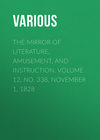Read the book: «The Mirror of Literature, Amusement, and Instruction. Volume 12, No. 338, November 1, 1828», page 3
Life was now fast ebbing from the side of Rudolf, when he was aroused by the sound of a voice, whose tones even at this dreadful moment thrilled through his soul with horror. Enveloped in a thick fog which had been gradually spreading around the scene of the combat, he could discern the fiend Heidelberger and his charmed circle; with an air of triumph they chanted the following lines:—
Mortal vain, thy course is run,
Thou hast seen thy setting sun—
Told I not true when I saw thee last,
That 'ere the circling year had passed,
Under the greenwood thou should'st be dying,
On the bloody greensward lying!
Deceived once, I tell thee never
Shall my victim from me sever—
Thou hast dared to brave our hate,
Rashly run upon thy fate!
Thou art on the greensward dying,
Underneath the greenwood lying!
The hounds bayed. The moon entered a dark cloud; and, when it emerged, its pale beams fell upon the green amphitheatre and the aged tree; but there was no one under its shade.
The following tradition is still related amongst the surrounding peasantry:—The Baron Rudolf, it is said, was enticed to sign over the bodies and souls of his future offspring to the fiend, Heidelberger, on condition that the latter would enable him to gain the person and possessions of the Lady Agatha. The contract, however, was obliged to be renewed at the birth of each child. Should he violate this convocation (which he signed with his own blood,) he granted similar power over himself; and the legend goes on to relate, that the whole of the members of the charmed circle were persons similarly enticed, who were doomed to a sort of perpetual labour, being compelled to chisel out their coffins in stone, which as soon as finished, were broken in pieces, when they were obliged to begin afresh.
The consequence of the Baron's non-fulfilment of his convocation have already been seen; his son is related to have died childless, and the property to have been dispersed into the hands of others, having never remained since his death more than two generations in one family; apparently blighting all its possessors. And the peasantry aver that the noise made by the continual labour of its victims, may still be heard by the adventurous at the close of day.
VYVYAN
SPIRIT OF DISCOVERY
On Planting Poor Light Land
Besides paring and burning, and trenching the soil previous to making the plantation, Mr. Withers, (who received the large silver medal from the Society for the Encouragement of Arts, &c. London, for experiments conducted on the subject in Norfolk,) spreads on it marl and farmyard dung, as for a common agricultural crop, and at the same time keeps the surface perfectly free from weeds by hoeing till the young trees have completely covered the ground. The progress that they make under this treatment is so extremely rapid, as apparently to justify, in an economical point of view, the extraordinary expenses that attend it. In three years, even oaks and other usually slow growing forest trees have covered the land, making shoots by three feet in a season, and throwing out roots well qualified, by their number and length, to derive from the subsoil abundant nourishment, in proportion as the surface becomes exhausted.—Trans. Soc. Arts.
The Air Plant
Prince Leopold has succeeded in bringing to perfection that extraordinary exotic, the air plant. It is suspended from the ceiling, and derives its nourishment entirely from the atmosphere.
Potato Flour
The farina, or meal, obtained from potatoes is now regularly sold in the markets of Scotland. It is stated to be quite equal to genuine arrow root; but this is quite a mistake, unless the nutritious properties of arrow root have been overrated. Sir John Sinclair has devoted much of his time to the preparation of the flour; but as we gave his process many weeks since, it is not necessary to repeat it here.
Kynaston's Cave
We are indebted to the portfolio of an interesting lady correspondent for the original of the above engraving. The ingenious draughtswoman states the drawing to have been taken during a recent tour; and our readers will allow it to be fair sketch. By way of rendering it unique, we append the following description from the same fair hand:—
From Shrewsbury to the Ness Cliff, (on the road to Ceriogg Bridge,) there is in the scenery little worthy of remark, until we approach the latter place, when the cliff on the right hand, and the Brathyn mountains (Montgomeryshire) on the left of the traveller, produce a very picturesque effect; and the post-house of Ness Cliff commands an extensive and lovely view of mountainous and champagne country. At this place we were invited to see a curious cave cut in the rock, which was, in the sixteenth century, the residence of one Humphrey Kynaston, a notorious bandit. This, however, was not his own work, since Ness Cliff, having been worked as a quarry, the cave, either by accident or design, was wrought by the labourers, and used by them as salle á manger, dormitory, or tool-house, according to circumstances. We proceeded to it by a broad rising walk of red sand, delightfully wooded, and presenting an enchanting view of the Brathyn and Wrekin, as well as the country for some miles round. At the end of this walk is a gate, which opens into a small grove; proceeding a little into which, we saw the cave in the high red cliff immediately before us. We ascended by a considerable flight of narrow and rugged steps cut from the solid rock: the interior of this curious place is as black as a coal-mine, and a partition, more than half the way across, divides the part where Kynaston used to reside by day from that in which he slept and kept his horse, for he had actually the ingenuity to make the animal ascend and descend the stairs above-mentioned. The robber's initials, and the date of the year in which we may suppose he cut them, appear on the partition just opposite the entrance. The romance of the place was not a little augmented by the appearance of its inhabitant, (a blacksmith,) whose tall, thin figure, and whose pale, wild, and haggard countenance, well accorded with the singularity of his abode. He read for our amusement and instruction, I conceive, a few choice passages from a well-thumbed penny pamphlet, purporting to contain the veritable history of the adventurous Kynaston; from whence it appeared that Master Humphrey was a gentleman, like "that prince of thieves," Robin Hood, stealing from the rich to give to the poor, avenging the innocent, and chivalrous where ladies, or the lure of plunder, called forth his prowess; that his depredations were numerous, even in the face of day, and in the teeth of his enemies; and yet that those who admired and sided with him were for a considerable period the terror of the whole legal force who were on the alert to seize him. This interesting memoir was recited by the son of Vulcan, with an enthusiasm and delectable pronunciation, that could only be appreciated by hearing it, and was altogether inimitable. Strange! thought I, that this cave, once the residence of a robber, should now have become that of a forger.
M.L.B
The Selector; and Literary Notices of New Works
RIENZI
In No. 335, we gave the outline of the story of Rienzi, principally from Gibbon, but interspersed from other authorities. Miss Mitford's tragedy has since been represented with considerable success, and published. In the preface, we are told, that in addition to the splendid narrative of Gibbon, recourse has been had to "the still more graphical and interesting account of Rienzi's eventful career," contained in L'Abbé de Sade's Memoirs of Petrarque; and that, "as far as the female characters are concerned," the materials are entirely from invention. All this may appear well enough for the construction of the drama, and the female characters are drawn with peculiar grace and feeling; but we do not see why the character of Rienzi should be so essentially altered from history as it has been; neither do we think that any desirable effect has been gained by this change. In history, Rienzi is a master-spirit of reckless and atrocious daring, but in the drama, he is softened down to a fickle liberty brawler, and the sternest of his vices are glossed over with an almost inconsistent show of affection and tenderness. As he there stands, he is rather like an injured man, than one who so liberally dealt oppression and injustice around him.
Miss Mitford's tragedy will, however, be read with considerable interest in the closet, and fully to appreciate its beauties, every one who has witnessed it, ought to read it; for many of its "delicate touches" must be lost in the immense area of Drury Lane Theatre. 2 The plot is simple, and is effectively told; but as the newspapers, daily and weekly, have already detailed it, we shall confine ourselves to a few passages, which, in our reading, appeared to us among the many beauties of the drama.
PROGRESS OF RIENZI'S DISAFFECTION
Claudia. He is changed,
Grievously changed; still good and kind, and full
Of fond relentings—crossed by sudden gusts
Of wild and stormy passion. Then, he's so silent—
He once so eloquent. Of old, each show,
Bridal, or joust, or pious pilgrimage,
Lived in his vivid speech. Oh! 'twas my joy,
In that bright glow of rapid words, to see
Clear pictures, as the slow procession coiled
Its glittering length, or stately tournament
Grew statelier, in his voice. Now he sits mute—
His serious eyes bent on the ground—each sense
Turned inward.
Rienzi. Claudia, in these bad days,
When man must tread perforce the flinty path
Of duty, hard and rugged, fail not thou
Duly at night and morning to give thanks
To the all-gracious power that smoothed the way
For woman's tenderer feet.
Colonna. He hath turned
A bitter knave of late, and lost his mirth,
And mutters riddling warnings and wild tales
Of the great days of heathen Rome; and prates
Of peace, and liberty, and equal law,
And mild philosophy, to us the knights
And warriors of this warlike age, who rule
By the bright law of arms. The fool's grown wise—
A grievous change.
Hatred—
And danger—the two hands that tightest grasp
Each other—the two cords that soonest knit
A fast and stubborn tie: your true love-knot
Is nothing to it. Faugh! the supple touch
Of pliant interest, or the dust of time,
Or the pin-point of temper, loose, or not,
Or snap love's silken band. Fear and old hate,
They are sure weavers—they work for the storm,
The whirlwind, and the rocking surge; their knot
Endures till death.
RIENZI'S TRIUMPH
Hark—the bell, the bell!
The knell of tyranny—the mighty voice,
That, to the city and the plain—to earth,
And listening heaven, proclaims the glorious tale
Of Rome reborn, and Freedom. See, the clouds
Are swept away, and the moon's boat of light
Sails in the clear blue sky, and million stars
Look out on us, and smile.
[The gate of the Capitol opens, and Alberti and Soldiers join the People, and lay the keys at Rienzi's feet.]
Hark! that great voice
Hath broke our bondage. Look, without a stroke
The Capitol is won—the gates unfold—
The keys are at our feet. Alberti, friend,
How shall I pay thy service? Citizens!
First to possess the palace citadel—
The famous strength of Rome; then to sweep on,
Triumphant, through her streets.
[As Rienzi and the People are entering the Capitol, he pauses.]
Oh, glorious wreck
Of gods and Caesars! thou shalt reign again,
Queen of the world; and I—come on, come on,
My people!
Citizens. Live Rienzi—live our Tribune!
CLAUDIA'S LAMENT FOR HER HUMBLE HOME
Mine own dear home!
Father, I love not this new state; these halls,
Where comfort dies in vastness; these trim maids,
Whose service wearies me. Oh! mine old home!
My quiet, pleasant chamber, with the myrtle
Woven round the casement; and the cedar by,
Shading the sun; my garden overgrown
With flowers and herbs, thick-set as grass in fields;
My pretty snow-white doves: my kindest nurse;
And old Camillo!—Oh! mine own dear home!
AMBITION
Alas! alas!
I tremble at the height, Whene'er I think
Of the hot barons, of the fickle people,
And the inconstancy of power, I tremble
For thee, dear father.
RIENZI'S WRONGS
One of the Ursini is condemned to death—his brother intercedes.
Rie. And darest talk thou to me of brothers? Thou,
Whose groom—wouldst have me break my own just laws,
To save thy brother? thine! Hast thou forgotten
When that most beautiful and blameless boy,
The prettiest piece of innocence that ever
Breath'd in this sinful world, lay at thy feet,
Slain by thy pampered minion, and I knelt
Before thee for redress, whilst thou—didst never
Hear talk of retribution? This is justice,
Pure justice, not revenge!—Mark well, my lords,
Pure, equal justice. Martin Ursini
Had open trial, is guilty, is condemned,
And he shall die!
Colonna. Yet listen to us—
Rie. Lords,
If ye could range before me all the peers,
Prelates, and potentates of Christendom,—
The holy pontiff kneeling at my knee,
And emperors crouching at my feet, to sue
For this great robber, still I should be blind










